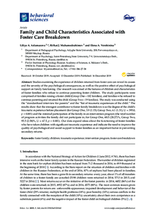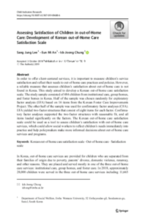Displaying 581 - 590 of 2221
Using Swedish registry national data, this study explored the relationship between immigration-country of birth status, psychosocial risk factors, and child compulsory care for parents with risky substance use (RSU).
Using Swedish registry national data, this study explored the relationship between immigration-country of birth status, psychosocial risk factors, and child compulsory care for parents with risky substance use (RSU).
This research was aimed at the features of children and characteristics of foster families who refuse to continue parenting foster children.
This article presents findings and recommendations from the first year of a two-year evaluation of the Local Interagency Network for Children and Family Services (LINCS) program, a part of the Shasta County Department of Social Services in northern California.
This paper from the Australian Institute of Criminology presents selected findings of a detailed case file audit of 300 crossover children (children from child protection backgrounds in the youth justice system) appearing before the Children’s Court of Victoria, Australia in 2016–17.
Drawing on the findings of a Churchill Fellowship study tour, this article discusses the need to expand understanding of family engagement and, in particular, to implement Family Inclusive practice in Australian child welfare, both to increase reunification and to improve outcomes for children who do not return home.
This study aims to develop a Korean out-of-home care satisfaction scale based on questions from the Foster Care Improvements Project.
This study aimed to develop a Korean out-of-home care satisfaction scale. The study sample consisted of 484 children from institutional care, group homes, and foster homes in Korea.
This study aimed to systematically review motivational interviewing (MI) with child welfare (CW) families as well as MI training with CW workers and social work students training to become CW workers.
The purpose of the study was to uncover challenges during the transition to adulthood for youth with disabilities who experienced foster care and elucidate the supports most beneficial in addressing these challenges.



